#FuelCell
Study: Hydrogen Power Is Also Bad
Of all the American adages, “there ain't no such thing as a free lunch” has to be the most applicable and it often comes to mind whenever the automotive sector spins itself up over alternative energy vehicles. While it is comforting to assume that novel powertrains are going to create a world where nothing is wasted and no environmental harm is done, the laws of nature don’t really support the theory.
BMW Says Hydrogen Power Still an Option, Bullish on EVs
While BMW anticipates that half of its total sales will stem from electric vehicles by 2030, it recently announced that hydrogen power is still on the table. In fact, the German brand has suggested that it may even bring one to market in a few years.
Junkyard Find: 2017 Toyota Mirai Fuel Cell
I have become accustomed to running into the unexpected during my junkyard travels, finding everything from a JDM Nissan Fairlady Z to a bullet-riddled Cadillac from a Mythbusters episode to a British tank. That said, I never expected to find a four-year-old hydrogen fuel-cell car, more than a thousand miles from the only state in which they were sold that year. This becomes the newest junkyard car I’ve documented, taking the top spot from the now-second-place 2015 Mitsubishi Mirage.
Genesis Going All Electric in 2025
Genesis presented its vision a sustainable future on Thursday and settled upon total electrification, just like every other automaker. Hyundai’s luxury component plans to become a “100-percent zero-emission vehicle brand by 2030” but foresees the need to wait until 2025 to transition its fleet entirely over to battery and hydrogen power.
Does it mean anything? If the automotive industry’s prior promises of automated driving and EV sales are anything to go by, probably not. However, electrification has gotten a major kick in the pants over the last few years as governments have ramped up regulator pressures and the sector has been flooded with money to help the cause. So there’s certainly a chance, just like when you play the lottery.
VW CEO Suggests Fuel Cell Tech Isn't the Answer, No Duh
Volkswagen Group CEO Herbert Diess was bashing hydrogen-powered vehicles on Twitter this week in an attempt to convince those vying for Germany’s chancellorship not to embrace the technology. With Angela Merkel stating that she’ll not seek a fifth term, the country is open for new leadership and VW wouldn’t want them to take a liking to hydrogen power when it has placed all of its eggs into the electric vehicle basket.
“The hydrogen car has been proven NOT to be the climate solution,” Diess wrote on Twitter in German. “In transportation, electrification has prevailed. Sham debates are a waste of time. Please listen to the science!”
GM Investing $2 Billion Into EV Startup Nikola
General Motors announced it will be taking an 11-percent stake in Nikola on Tuesday. It even said it would be actively helping the startup produce the hydrogen/battery-powered Badger pickup, sending the firm’s already-insane share price through the roof. Nikola shares were up 30 percent before the trading day even began, with the General seeing some positive changes in its own stock. Things only improved from there for both companies as news of the partnership continued to spread.
The deal is costing GM $2 billion and allots it one board member of its choosing in exchange for its manufacturing expertise.
Coronavirus Seems to Kill GM's Hydrogen Ambitions
Maybe the military will still be able to get one, but the cash-consuming coronavirus pandemic appears to have nixed any chance that a normal consumer will be able to slide into a fuel cell-powered General Motors vehicle anytime soon.
Good news for Honda, Toyota, and Hyundai?
Badger Begins: Nikola Now Taking Reservations
Early adopters willing to toss cash at an exciting idea have been the lifeblood of modern-day electric vehicles. Without investors believing in Tesla and cramming its sweet cheeks full of cash, it never would have gotten to a point where it could actually manufacture cars. The same is true for the thousands of people dropping deposits on vehicles that have yet to be produced, let alone tested by the community.
It’s time to do the same for American hybrid truck designer Nikola, true believers. The all-electric startup is now accepting deposits on its prospective pickup truck. Due to arrive in a few years, the unit currently has no prototype. Under normal circumstances, we’d continue ribbing the company via monthly updates until it dissolves like Faraday Future. But its ludicrous market valuation seems to indicate that the hype is very real, even if the same cannot be said about its products.
2019 Hyundai Nexo First Drive - The Future Is Beige
Hyundai’s hydrogen-powered Nexo is so ludicrously specialized that it’s utterly impossible to make a case for it outside of California. In fact, even that might be overstating its usefulness — allow me to try again. The Nexo Fuel Cell works near Los Angeles or San Francisco and absolutely nowhere else in North America. And, while that’s primarily due to its dependency on hydrogen fueling stations, which exist almost exclusively in two relatively small corners of the Golden State, it’s not the only reason.
You need to be a certain type of person to want to drive the Nexo. Someone who likes making a statement, is interested in green tech, and possesses absolutely zero interest in spirited bouts of driving. It’s slow, appliance-like, and offers nothing to the typical enthusiast crowd, save for some interesting styling. However, if you want something eye-catching that runs on alternative energy and routinely spend a large portion of your day in horrible LA traffic, it could be the right tool for the job.
It's Frustrating Times for Owners of Hydrogen-powered Cars
They’re the rarest breed on the road, drawing their car’s fuel source from the world’s most plentiful element — which just happens to be the hardest to get your hands on in any large quantity. Fuel cell vehicle drivers, of which none exist outside of California, depend on a small network of H2 refueling stations to stay on the road, and the drawbacks to using this rare power source are already well documented.
You’ll be renting a car if your road trip takes you too far from San Francisco or the SoCal area. Supply issues sometimes leaves that one nearby station out of service, as happened earlier this year. It’s almost as if a vehicle you plug into a wall is a better green idea, at least on the downstream side.
Regardless, these Honda Clarity FC, Toyota Mirai, and Hyundai Tucson FC owners made their bed and were prepared to lie in it. Unfortunately for them, the refueling network has once again revealed its fragility.
Auto Executives Secretly Believe Battery-electric Cars Aren't the Future
While fuel-cell technology is progressing in places like California and Japan, the rest of the world shrugged it off after the initial hype subsided. Since then, practically every automaker in existence has invested in battery technology and electrification. However, according to a recent survey, most auto executives secretly do not believe batteries will be the real breakthrough in electric mobility. Dealers feel the same way, but they’ve been less cagey on the matter.
Uh, what? Then why is everyone and their mother talking up plug-in cars and sweeping the fuel cell under the carpet?
Well, in addition to hydrogen having an abysmal fueling infrastructure almost everywhere, governments simply aren’t pushing it like battery power. Incentivizing plug-in cars has gone a long way to bolster the segment’s popularity and, with China mandating that a growing portion of all auto sales be battery-related, companies have to lean into what they already have. That said, many executives still seem to feel that hydrogen-powered cars have more to give the industry.
Let’s not get ahead of ourselves. Its time to talk about why auto dealers are so unhappy about the electric revolution.
Hyundai Plans New Fuel Cell Vehicle for CES, But What's This About Powering Your Home?
Despite the inherent challenges with using hydrogen as a fuel source, Hyundai is plowing ahead with a new generation of fuel cell vehicle as a follow up to the Tucson Fuel Cell it currently offers in limited markets.
Difference is, the current hydrogen-powered Tucson shares a lot of sheetmetal with the traditionally fuelled Tucson. The new, as yet unnamed, hydrogen crossover doesn’t look like anything in Hyundai’s portfolio … at least not yet.
Here is General Motors' New 'Truck' Intended for Governmental Use
Regardless of whether it’s brought upon us by climate change, divine intervention, or civil unrest, the end times are right around the corner — and the government is going to need a rugged and versatile vehicle for the impending apocalypse. The automaker with the chops to deliver such a platform? General Motors.
Apparently not Skunk Works levels of classified, GM publicly announced the Silent Utility Rover Universal Superstructure (SURUS) on Friday morning. While not the classic image of a motorized vehicle, the design is intended to serve as the underlying architecture of governmental and commercial transports alike. While the specific government applications are a question mark, the platform’s fuel cell system allows it to run silently with a minimal heat signature — making it ideal for sneaking men and munitions behind enemy lines.
At least, that’s the theory.
Further Proof That Hydrogen Cars Are Stupid
Hydrogen is the most abundant element in our universe and hydrogen-powered vehicles produce only a single emission: water. It’s no wonder a handful automakers have touted it as the next-step in “sustainable” transportation, because it looks great upon a cursory examination. But it hasn’t held up under increased scrutiny and numerous manufacturers have been highly critical of fuel cell cars.
Earlier this year, Jaguar Land Rover’s technical design director called hydrogen-powered vehicles a disaster in practical efficiency. Tesla Motors’ Elon Musk went even further, calling the technology “incredibly dumb.” More recently, VW Group also hinted that it thought there wasn’t going to be much of a future for fuel cells. Matthias Mueller’s address at the Frankfurt Auto Show was heavy on electrification and light on hydrogen, with Audi spearheading the technology.
Although, if president of Audi of America Scott Keogh is to be believed, it looks to be a rather dull spear they are using.
Geneva 2017: Hyundai's Water-inspired FE Fuel Cell Concept
For reasons unbeknownst to me, Hyundai Motors revealed its next-generation hydrogen fuel cell concept at the Geneva Motor Show this week — showing continued commitment to the technology, despite the lack of infrastructure needed to make it truly viable. Dubbed the FE, or “Future Eco,” the company says the SUV alludes to its next phase of zero emission vehicles.
Sporting similar dimensions, the FE will likely replace the $50,000 Tucson Fuel Cell once it assumes its final form, because it cannot possibly go to market looking like this. Low profile whitewalls and oversized drug dealer rims rarely end up as from-the-factory hardware. However, there are some interesting off-kilter features that might stick around.



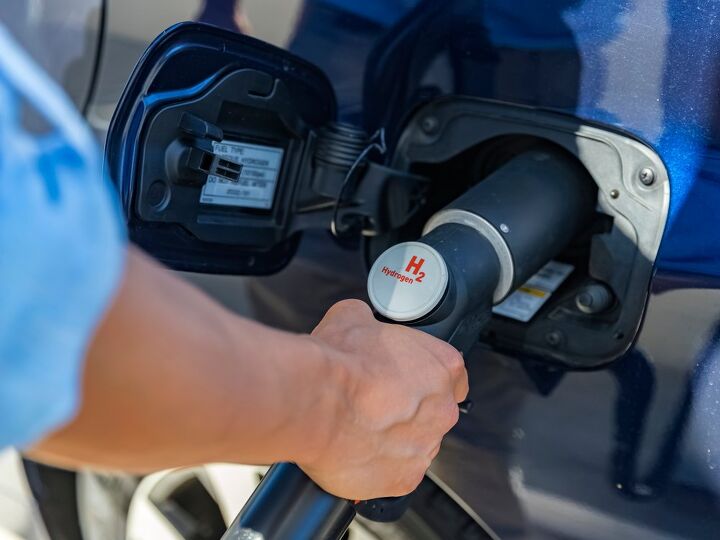

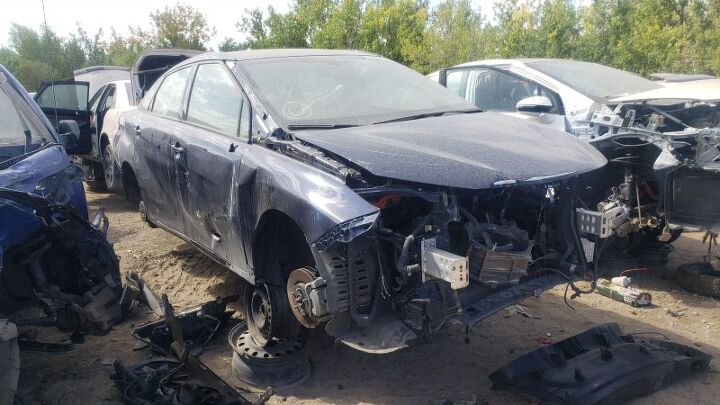
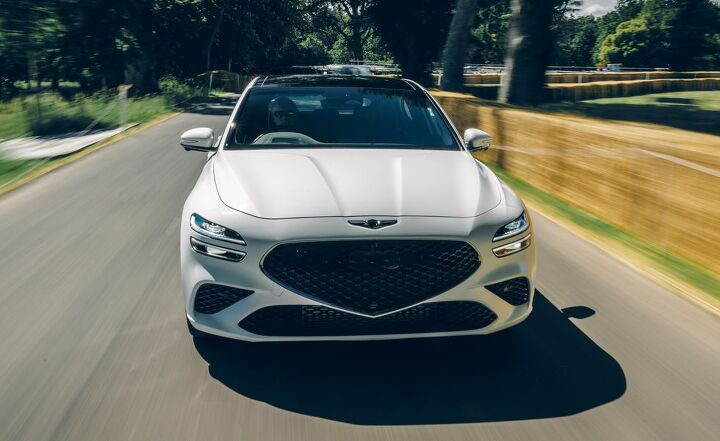


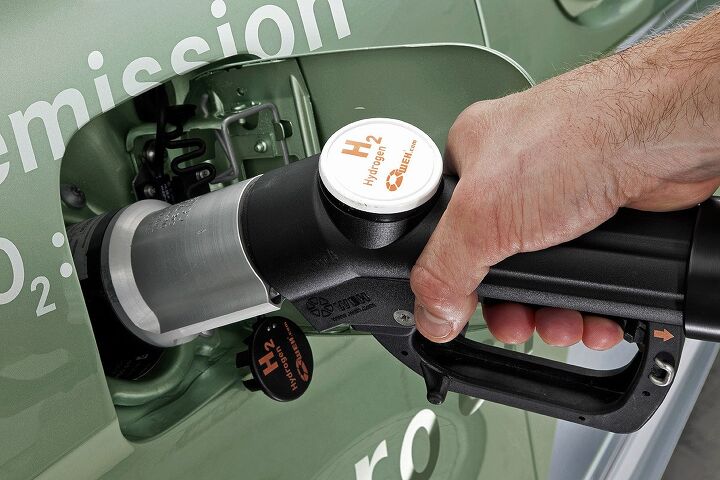

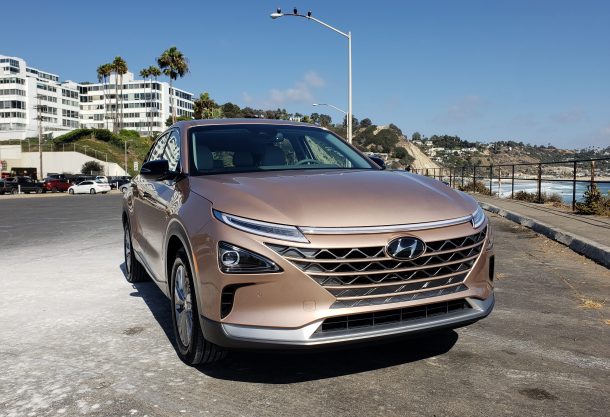

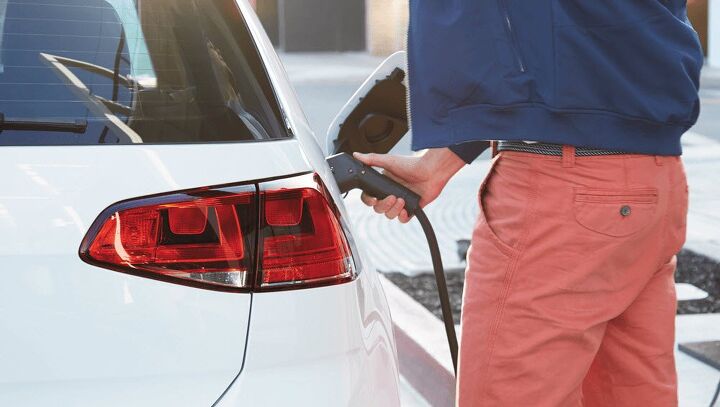

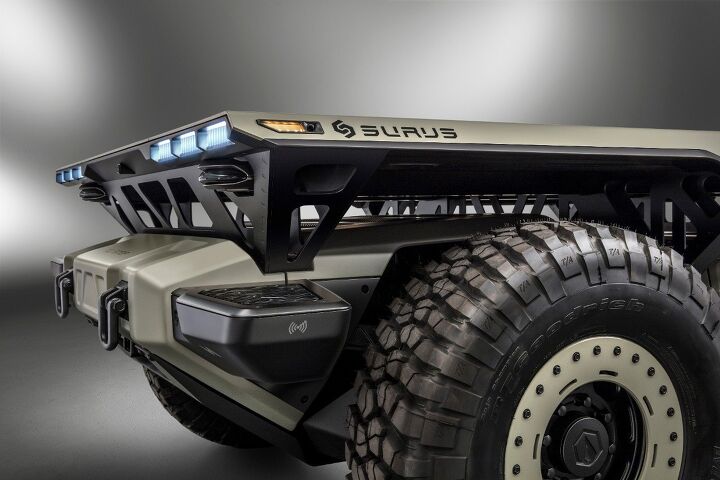
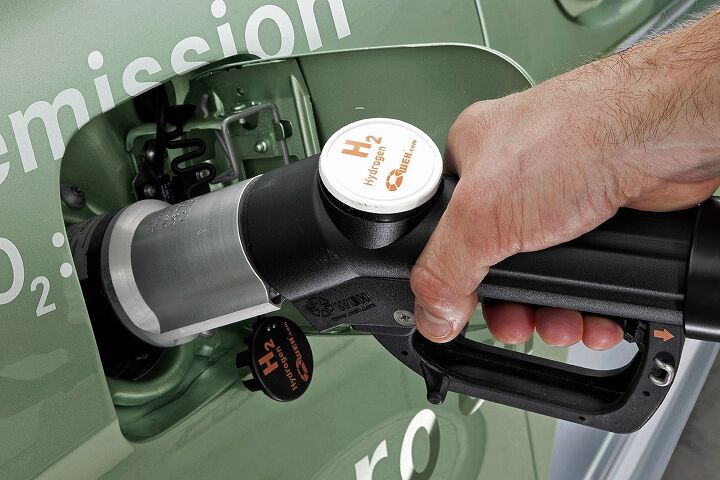
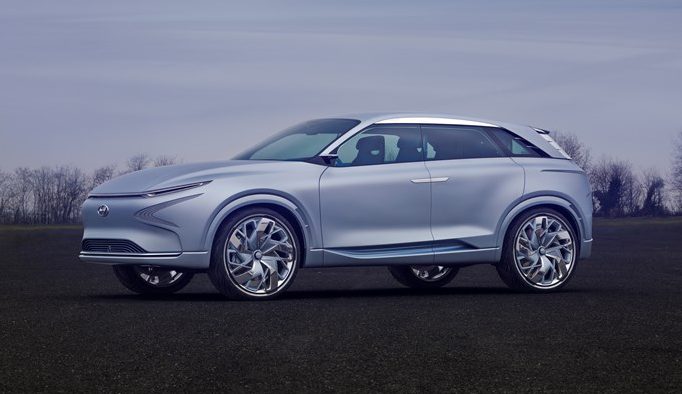












Recent Comments